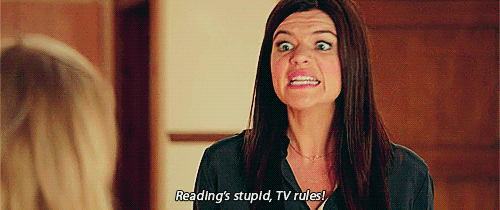Both Sides of Submittable
Most writers start out on one side of the screen, but the more committed we become to our craft, the more we realize the importance of participating in the literary community we’d like to be a part of—and for many writers, this translates to a donation of time and effort by working on a literary magazine (usually unpaid, except in the rarest of circumstances or forays into Bizarro World.)

http://wifflegif.com/gifs/45404-this-is-how-i-am-lol-saturday-night-live-gif
Once you end up on the other side of Submittable, you start to notice…certain things.

http://wifflegif.com/gifs/199835-james-franco-surprised-reaction-gif
(No, James Franco hasn’t submitted his work to Lunch Ticket. YET.)
But those things you notice, once you’re on the other side of Submittable…those things are useful, too. For when you’re back on the submitter side of the screen!

http://wifflegif.com/gifs/299804-i-knew-i-had-an-account-already-gif
(This is how you might look, once you figure out how working for a literary magazine makes you a better writer, and helps you target your submissions better.)
Here are the top 5 things that working on a literary magazine will help you with, when it comes to submitting your own work:
1. You Will ALWAYS, always, ALWAYS read the guidelines.

http://wifflegif.com/gifs/444421-reading-is-stupid-tv-rules-gif
TV *does* rule, but don’t be her. Just…don’t.
It’s like tipping, after you’ve worked as a server. You know how rude and inconsiderate it is NOT to do it. So you won’t. And if you discover you made a guidelines error after the fact, you’ll make sure to correct it, so you’re not wasting anyone’s time. Because once you’ve been the person sending out “Does Not Comply” declines and re-assigning re-submissions, you’ll want that hour of your life back.
2. You Notice Problems in Your Own Work By Seeing Those Problems in the Submissions Queue.

http://wifflegif.com/gifs/154436-krysten-ritter-omg-this-is-boring-eye-roll-gif
You will see the same problems, over and over again: flat characters, undeveloped narrative arc, poor suspension of disbelief, lack of imagery, purple prose, reliance on sentimentality or clichés, typos, poor grammar, predictable plotlines, unnatural dialogue, Courier New font…and when you sit down to edit, you’ll be more attuned for looking for those flaws first, that you’ll see them more readily in your own work, because you’re able to read faster and more efficiently.
3. Get On Their Level.

http://wifflegif.com/gifs/5061-were-not-worthy-reaction-gif
This is the flipside of point #2—not only will you see a lot of writing that doesn’t work on some level, you’ll be the first to read pieces that simply Blow. You. Away. You’ll see risks that pay off, peers that are producing work that you can’t even wrap your head around, and getting first crack at stories that stay with you, poems that sing. And you’ll feel like you’re not worthy to be evaluating these writers, or in the privileged position of accepting their work, because they’re so much better than you are, and you have so much to learn from them. So do that.
Get on their level.
4. There’s No “I” in “Team”, Even If There Is In “Writing.”

http://wifflegif.com/gifs/425233-michael-scott-paper-company-gif
You will learn the art of compromise, and how to evaluate work that may not be to your taste. You’ll learn to make the distinction between your preferences and strong work. You may love confessional poetry, but if one on your team loves narrative poetry and another one likes language poetry, you’ll learn how to spot strong pieces in those forms. And who knows…you might even branch out and try something new in your own work. But that new-found versatility will make you an asset in the workshop, and it’ll make you be more comprehensive in editing your own work, and the work of your peers. It’ll also give you a crash course in magazines whose editorial staffs have an aesthetic preference, so you can target your own submissions more efficiently.
5. You Will Have More Empathy.

http://wifflegif.com/gifs/395921-or-how-about-a-general-moral-compass-gif
Sure, you’ll still get depressed when you get a rejection of your own…but you’ll handle it better, because you’ll know that sometimes it’s really *not* personal, and it’s simply a game of numbers and timing. You’ll appreciate that editor who wrote a quick note to praise something in your piece that didn’t work. You’ll get irrationally angry about the form decline that simply says “Not for us,” because you’ll know how easy it is to update that (Thanks, Submittable!) But most of all, you’ll appreciate every acceptance or “This was really close, please try us again!” that you receive because you’ll have waded through *literally* hundreds of submissions on your own, and had to whittle those hundreds down to 10, maybe 15 acceptances if you’re lucky—you’ll have more empathy, because you’ll actually see what editors deal with, day in and day out, each reading period, just because they love the writing.
The Pay Is Terrible and The Work Is Thankless—Volunteer to Work For a Lit Mag!

http://wifflegif.com/gifs/330798-the-lonely-island-black-and-white-gif
Preserving the Arts and Building Your Starving Artist Street Cred Daily!





